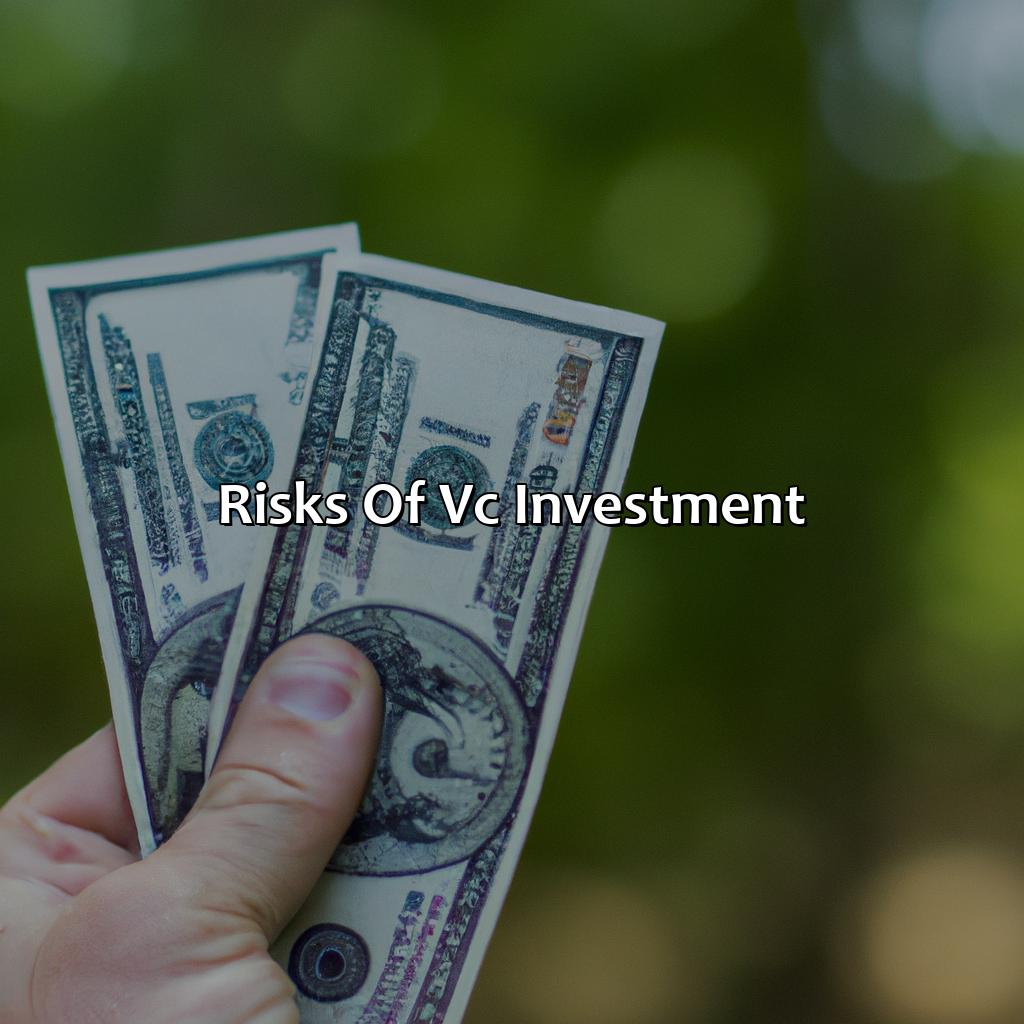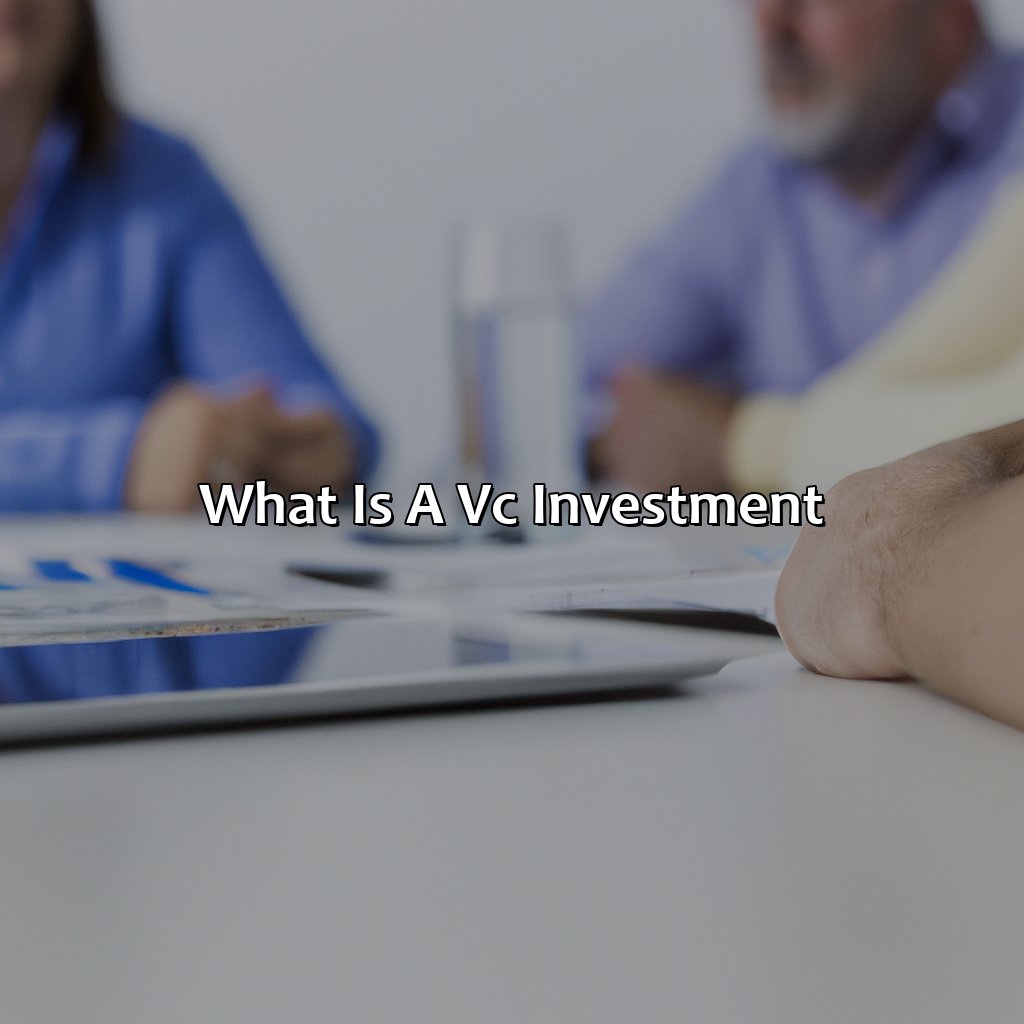What Is A Vc Investment?
Key Takeaway:
- VC Investment refers to the financial support provided to startups by venture capitalists in exchange for equity in the company. The purpose of VC investment is to help startups grow and scale their business.
- One of the key advantages of VC investment is the potential for high return on investment. VC investors typically invest in high-growth startups with the potential for significant returns.
- VC investment also provides support for startups beyond just financial investment. VC investors often bring their expertise and network to the table, providing guidance and connections to help startups succeed.
- However, VC investment also comes with risks, including high risk due to the nature of investing in early-stage startups, and limited control over the business due to the minority equity stake held by the investor.
- There are different types of VC investment available, including seed funding, series A funding, and series B funding, which vary in terms of the stage of the startup and the amount of investment required.
Are you considering investing in a venture capital firm? Knowing what a venture capital investment is and how it works is essential to make an informed decision. You’re in the right place! In this blog, you’ll learn all about venture capital investments and their advantages.
VC Investment
What is VC Investment?
VC Investment, or venture capital investment, is a form of financing that investors provide to startup companies and small businesses that have high potential for growth in exchange for an ownership stake in the company. It is generally considered a high-risk, high-reward form of investment, as many startups fail to achieve success and the investor risks losing their investment.
Why do investors and venture capitalists take it on?
Investors and venture capitalists take on VC investment because they believe that the potential reward is worth the risk. By investing in a startup or small business at an early stage, they have the opportunity to own a significant portion of the company if it succeeds. This can lead to substantial financial gains if the company goes public or is acquired by a larger company.

Image credits: retiregenz.com by David Washington
Definition of VC Investment
Venture Capital Investment- What Exactly Is It?
Venture Capital Investment is a type of private equity financing where investors provide capital to start-ups or small businesses in exchange for ownership stake. VC investors usually provide more than just funds and actively involved in helping the companies grow, such as providing expertise, connections and mentorship.
These investments are made in young firms with high growth potential that have unique ideas or technology. The objective of VC investment is to achieve higher returns by investing in businesses that may not have secure funding and may be considered too risky for conventional banks or lenders.
VC investments are typically considered long-term and require a significant amount of research and analysis before any money exchanges hands.
It’s essential for entrepreneurs to keep the benefits of venture capital investment in mind when making business decisions. While it’s not the right choice for everyone, those who miss out on VC investment can miss out on significant opportunities.
VC investment: where wealthy individuals become even wealthier by betting on the success of others…it’s like a high-stakes game of Monopoly, except the losers can’t just flip the board and storm off.
Purpose of VC Investment
VC Investment is a funding process where venture capitalists invest in promising startups with the aim of generating high returns. VC investment is guided by the intention of providing financing to businesses with growth potential and innovative ideas that are capable of reshaping the industry landscape. As a relatively risky investment, VC firms seek to fund companies with strong leadership, market fit, and scalable products/services that can disrupt existing markets.
Such investors provide both financial support and mentorship to ensure their investments succeed. The investors also receive equity stakes in exchange for their funding, allowing them to share in the profits derived from successful ventures. In addition to funding financial aid, VCs also provide invaluable guidance based on years of industry experience.
Successful VC investments have yielded significant results across various industries such as technology, healthcare and renewable energy, resulting in noteworthy advancements globally. A prominent example is Andreessen Horowitz’s (a16z) 2009 investment of $25 million into Instagram which was later bought by Facebook for $1 billion two years later.
Startups looking to grow rapidly but have limited access to traditional financing should consider seeking VC investment as it could lead to lucrative returns on investment. Why settle for a small piece of the pie when you can get a slice of the whole VC pie with the advantages of VC investment?
Advantages of VC Investment
It’s time to explore the advantages of VC investment! With a focus on high returns and support for startups, investors and startups both benefit from VC. It offers superior ROI and provides resources for growth and success in the long run.

Image credits: retiregenz.com by Joel Arnold
High Return on Investment
Investing in venture capital presents the potential for substantial financial gain. VC investment has a strong potential for generating high returns as compared to other investment alternatives.
Primarily, VC investment offers opportunities to invest in startups that have considerable growth potential and can secure high returns. Also, VCs often invest during a company’s early stages, meaning investors benefit from buying shares at lower costs. Additionally, VC investors typically take an active role in developing the business and therefore increase their chances of success.
Moreover, venture capitalists’ experience and networks are critical factors that contribute to higher returns on investment. They offer expertise and guidance to companies they invest in, which is likely to result in better decision-making and improved company strategies.
Pro Tip: Although investing with venture capitalists can result in significant rewards, these investments come with risks. Therefore it is essential to conduct thorough research before investing in any venture capital opportunity.
Starting a business without support is like jumping out of a plane without a parachute – possible, but not advisable. VC investments provide the safety net startups need to soar.
Support for Startups
One of the advantages of receiving venture capital investments is the provision of extensive support to startups. This includes financial backing as well as mentorship and networking opportunities. Through closely working with experienced investors, entrepreneurs can gain valuable insights into business strategy and management. Additionally, VC firms often leverage their vast industry knowledge and connections to help startups expand their reach and access new markets. By tapping into these resources, startups increase their chances of achieving long-term success.
Moreover, beyond just providing funding and mentorship, VC investors often take a hands-on approach to supporting founders throughout each step of their journey. From refining product vision to navigating legal obstacles, VC firms become strategic partners for startups in ways that go beyond just capital investment. This level of commitment not only helps startups to grow faster but also ensures they are better positioned for long-term success.
In today’s competitive business landscape where startups are continually vying for investor attention, missing out on venture capital funding could be a costly mistake. With access to ample financial resources and valuable support from experienced investors, it’s clear that venture capital provides a critical lifeline for innovative new ventures looking to disrupt industries and drive growth. Thus, if you’re serious about taking your startup to the next level, it might be time to consider seeking out VC funding as soon as possible!
Why take a chance on VC investment when you could just throw your money into a wood chipper and get the same return?
Risks of VC Investment
Gaining knowledge about the dangers of Venturing Capital (VC) investing is essential. This type of investing entails giving money to new or expanding businesses. You must recognize the risks and limited command that come with this investment before making a decision. The high risk and limited control must be taken into account for a well-educated choice.

Image credits: retiregenz.com by James Arnold
High Risk
Venture Capital Investment-Revved up gamble!
Venture capital investments are the high-risk funding of start-up companies with the hope of a maximum return on investment. These investments are usually made in tech enabled start-ups that have high-growth potential, but also have a significantly high possibility of failure.
Investing in start-ups via venture capital firms is highly risky as there is a huge possibility of losing money altogether. Although an investor may come across several promising opportunities, it is important to keep in mind that only a few will provide substantial returns.
Not only do these investments pose financial risks, but there’s also a possibility of facing legal and reputational issues if the start-up or its founders engage in any fraudulent activities.
According to Forbes, 3 out of 4 startups fail. This presents significant dangers to novice investors looking for quick returns on their investment.
When investing in VC, you’re like a backseat driver, except you don’t even get to choose the car.
Limited Control on the Business
VC investments may result in limited control over the business for the investors. This can be due to the need for strategic decision-making and alignment with the entrepreneur’s vision. The investors’ input might not necessarily align with the founder’s perspective, leading to conflicts and challenges.
The entrepreneurs are typically in charge of day-to-day operations, while investors hold equity and may have a say in strategic direction. However, this could lead to a power struggle between investors and entrepreneurs, which could negatively impact the growth of the company.
Moreover, a lack of control over financial decisions might also be a roadblock due to the need for adherence to investor expectations. Investors may set specific conditions stipulating how funds should be allocated, which may limit an entrepreneur’s ability to make vital investments or pivot their business strategy.
Pro Tip: Investors should seek legal counsel before entering into VC agreements to ensure they are aware of any potential limitations on control or rights that come with such investments. Swimming with sharks is less risky than some types of VC investment, just ask any start-up founder.
Types of VC Investment
Evaluate Seed Funding, Series A Funding, and Series B Funding for understanding VC investment. Each has its own benefits and can be helpful for businesses developing at distinct levels.
Let’s analyze what all three involve.

Image credits: retiregenz.com by Adam Washington
Seed Funding
Seed Investment is the initial financial support given by a venture capitalist to a startup. This funding helps in the development and launch of the product or service. Seed Investment focuses on early-stage companies that have a unique and innovative vision.
Usually, Seed Investors take high risks with their investment since startups are at high risk of failure. Hence, they offer a lower amount of money for higher equity shares in return. This type of funding is vital for the startups as it paves the way for other investments and helps them grow.
It’s important to note that Seed Funding is different from Angel Investment since seed investors are usually highly skilled professionals looking to fund innovative products or services in exchange for equity shares.
A lack of funds can be a barrier to achieving success in any business venture, which makes this early investment crucial for many new entrepreneurs. Without proper funding, startups may struggle to survive, unable to develop essential resources necessary for future growth.
If you’re an entrepreneur with an innovative approach that has enormous potential but lacks the necessary funds, don’t hesitate to consider opting for Seed Funding — it could make all the difference in realizing your dreams!
Series A funding: where startups trade a piece of their company for a slice of the VC’s soul.
Series A Funding
Investment round for startups after the seed stage is called ‘Series A Funding’. It usually involves large investment amounts by venture capitalists in exchange for equity or stock ownership in the company.
Series A funding helps startups to scale their operations, develop new products, expand markets and attract top talent. Investors also provide mentorship, connections to relevant industry players and guidance on strategic decisions.
To qualify for Series A funding, startups need to demonstrate a solid business model, product-market fit, customer acquisition strategy and potential for high growth. They should have a credible management team with relevant experience and skills.
In 2005, the Social Networking startup Facebook raised $12.7M in Series A Funding led by Peter Thiel’s Founders Fund along with Accel Partners. This investment helped Facebook to develop its platform, improve user experience and recruit top talent which eventually resulted in becoming one of the most successful tech companies of all time.
Series B funding: where startups learn the art of asking for more money without sounding desperate.
Series B Funding
Investment in the second round of funding, targeting startup growth and expansion, is known as the series B funding stage. This stage typically involves larger investments from venture capital firms and institutional investors, who view startups with demonstrated market fit as worthwhile risks. Typically, series B funding allows startups to scale operations and grow their customer base through marketing efforts and product development. The risk level associated with series B funding is lower than previous rounds but higher than subsequent ones.
Pro Tip: Series B investors look for potential unicorns—startups that can potentially reach a $1 billion valuation—and thus they may want a say in management decisions through board seats or high equity stakes.
Some Facts About VC Investment:
VC investment typically involves high-risk, high-reward funding of startups and small businesses. (Source: Investopedia)
VC firms often provide mentorship, guidance, and industry connections to the companies they invest in. (Source: Entrepreneur)
VC investors usually expect to see a return on investment within 3-7 years. (Source: Forbes)
The majority of VC investment is concentrated in tech-related industries, such as biotech, software, and fintech. (Source: PitchBook)
VC investment has the potential to disrupt industries and drive innovation, but also comes with the risk of high failure rates. (Source: Bloomberg)
FAQs about What Is A Vc Investment?
What is a VC investment?
A VC investment refers to funding provided to startups or early-stage companies by venture capital (VC) firms. In exchange for the investment, the VC firm typically receives equity in the company and becomes a part owner.
How do VC investments work?
VC investments involve a process where investors pool money together to fund small businesses or startups that have high growth potential. The investors provide funding in exchange for equity in the company and often take an active role in developing the business.
What are the benefits of a VC investment?
VC investments can provide startups and early-stage companies with the funding they need to grow quickly and become successful. In addition to financial support, VC firms often provide startups with valuable connections, expertise, and guidance to help them succeed.
What are the risks of a VC investment?
VC investments carry a higher risk than traditional investments because they are made in startups that have not yet established a proven track record or revenue stream. There is a chance that the startup will fail, resulting in a complete loss of investment.
What types of companies are good candidates for VC investment?
VC firms typically invest in startups with high growth potential and innovative business models. These companies are often in the technology, healthcare, or biotech industries, and have the potential to disrupt established industries.
How can a startup attract VC investment?
Startups can attract VC investment by having a strong business plan, a clear value proposition, and a product or service that addresses a market need. Additionally, having a strong team and some early traction or revenue can also make a startup more attractive to VC firms.
 Checkout this IRS Loophole
Checkout this IRS Loophole 
